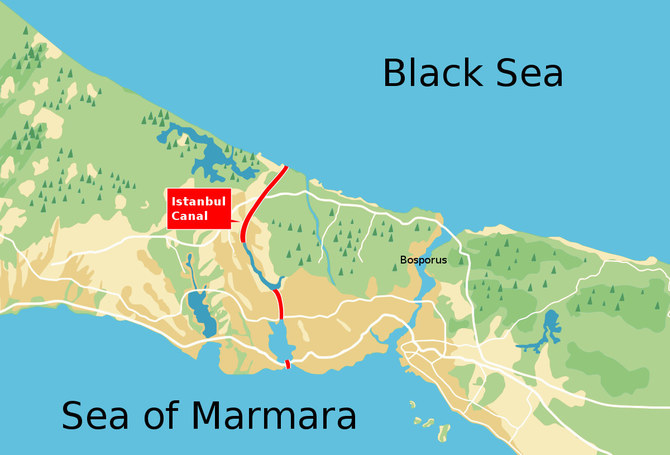ANKARA: With discussions over the revision of the 1936 Montreux Convention regarding control of the Istanbul Straits ongoing, Turkey recently approved development plans for the controversial 45-kilometer Kanal Istanbul project.
The project has attracted criticism not only for its financial cost and environmental impact, but also its potential repercussions for maritime transit.
The artificial seaway will cost an estimated $9.2 billion, and will connect the Black Sea north of Istanbul to the Marmara Sea to the south. It is intended to ease traffic on the Bosphorus Strait.
Kanal Istanbul is being touted as an alternative global shipping lane, but the scheme — first introduced to the public as a “crazy project” — has been harshly criticized by Istanbul’s opposition mayor Ekrem Imamoglu from the beginning.
In a rare move, 126 retired Turkish ambassadors released a statement on Friday warning that the Kanal Istanbul project could put the Montreux Convention at risk and have an adverse affect on Turkish interests.
“Kanal Istanbul will open the Montreux Convention to discussion, and will lead to Turkey’s loss of absolute sovereignty over the Sea of Marmara,” the statement said.
In an interview with HaberTurk on March 24, Speaker of the Turkish Parliament Mustafa Sentop was asked: “What if one day one president says, ‘I do not recognize (the) Montreux (Convention). I dissolved it’?”
Sentop replied: “He has the authority to do so. But there is a difference between possible and probable.”
In a 2018 presidential decree, Turkish President Recep Tayyip Erdogan assigned himself authority to withdraw Turkey from any international treaty or pact — such as the Montreux Convention — without parliamentary approval.
The convention grants free passage to all civilian vessels and determines the mode of entry and length of stay, as well as the tonnage, of warships from all non-littoral countries in the Black Sea.
Once completed, Kanal Istanbul will provide a shorter way for naval vessels from non-littoral countries to reach the Black Sea, so long as they pay the necessary fees.
But, if no further abrupt revision is made to the Montreux Convention, these vessels have to respect the rules of Montreux as they will enter Kanal Istanbul from the Dardanelles straits that are still determined by this decades-long international regime.
Aydin Sezer, an Ankara-based expert on Turkey-Russia relations, believes Russia will stand against any attempts to void the Montreux Convention, however.
“This international convention was prepared by convening relevant states at an international conference. Therefore, a unilateral withdrawal is unlikely, as it will draw serious anger and retaliation from the Kremlin side,” Sezer told Arab News.
In an interview in December 2019 with Turkish journalist Murat Yetkin, Aleksey Yerkhov, Moscow’s ambassador in Ankara, said that if the canal were to be built, Russia would insist on applying the provisions of the Montreux Convention to all passages.
Ozgur Unluhisarcikli, Ankara director of the German Marshall Fund of the United States, told Arab News: “There are two opposing views on whether Kanal Istanbul would fall under the Montreux regime if it were built. While I don’t think which interpretation gains acceptance will ultimately matter so far as vessels of war are concerned, I would not say the same thing regarding merchant vessels and revenue generation.”
Unluhisarcikli believes that Turkey will ultimately decide to unilaterally apply the provisions of the Montreux Convention concerning vessels of war, as any other course of action could lead to the collapse of the Montreux regime, making Turkey subject to pressure from both its Western allies and Russia.
“However, in this case Turkey could apply different rules to merchant vessels in order to be able to generate revenue,” he added.
“If Kanal Istanbul were accepted as falling under the Montreux regime, Turkey could find it difficult to generate significant revenue, as the Montreux Convention limits the taxes and charges that can be imposed on merchant vessels,” Unluhisarcikli concluded.




























